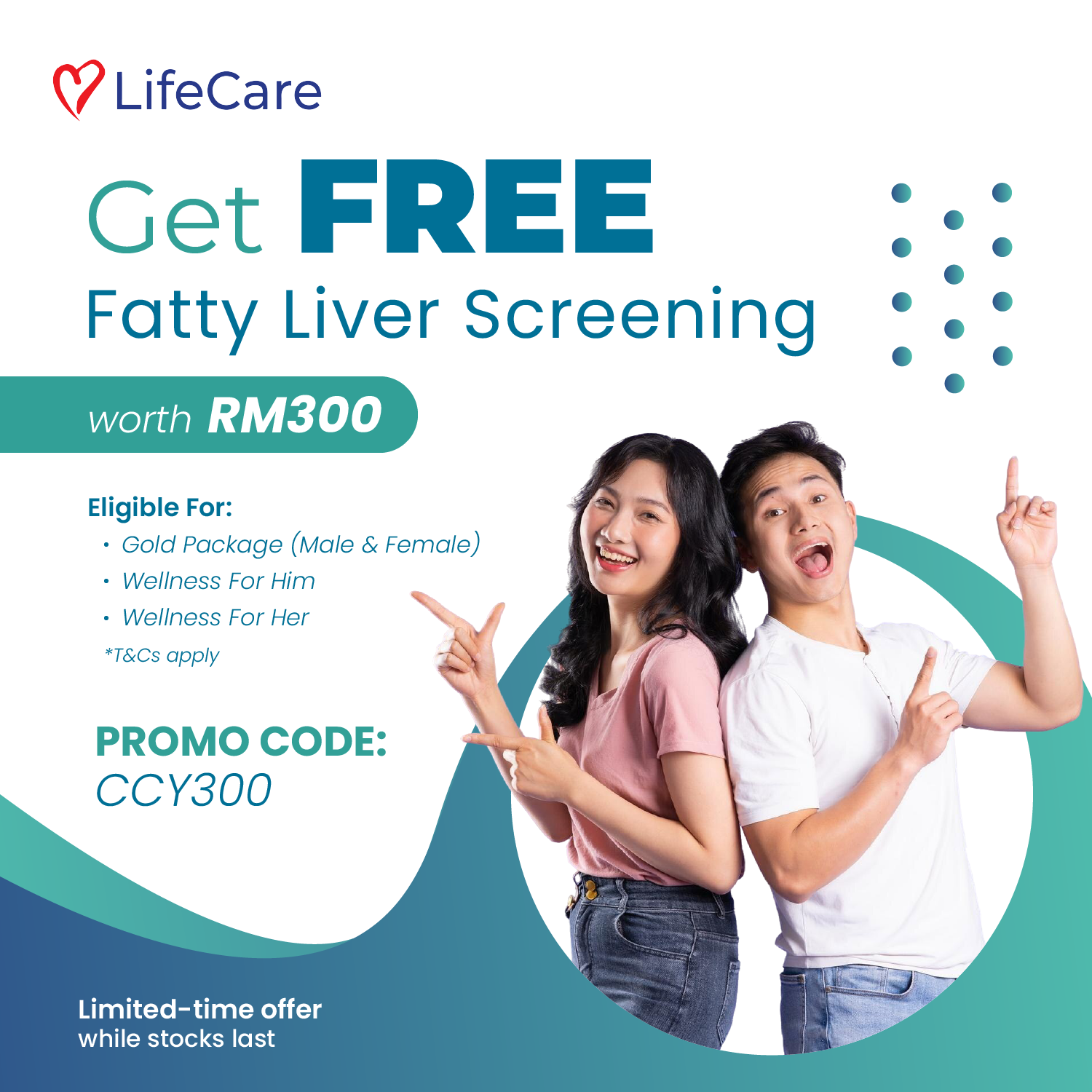
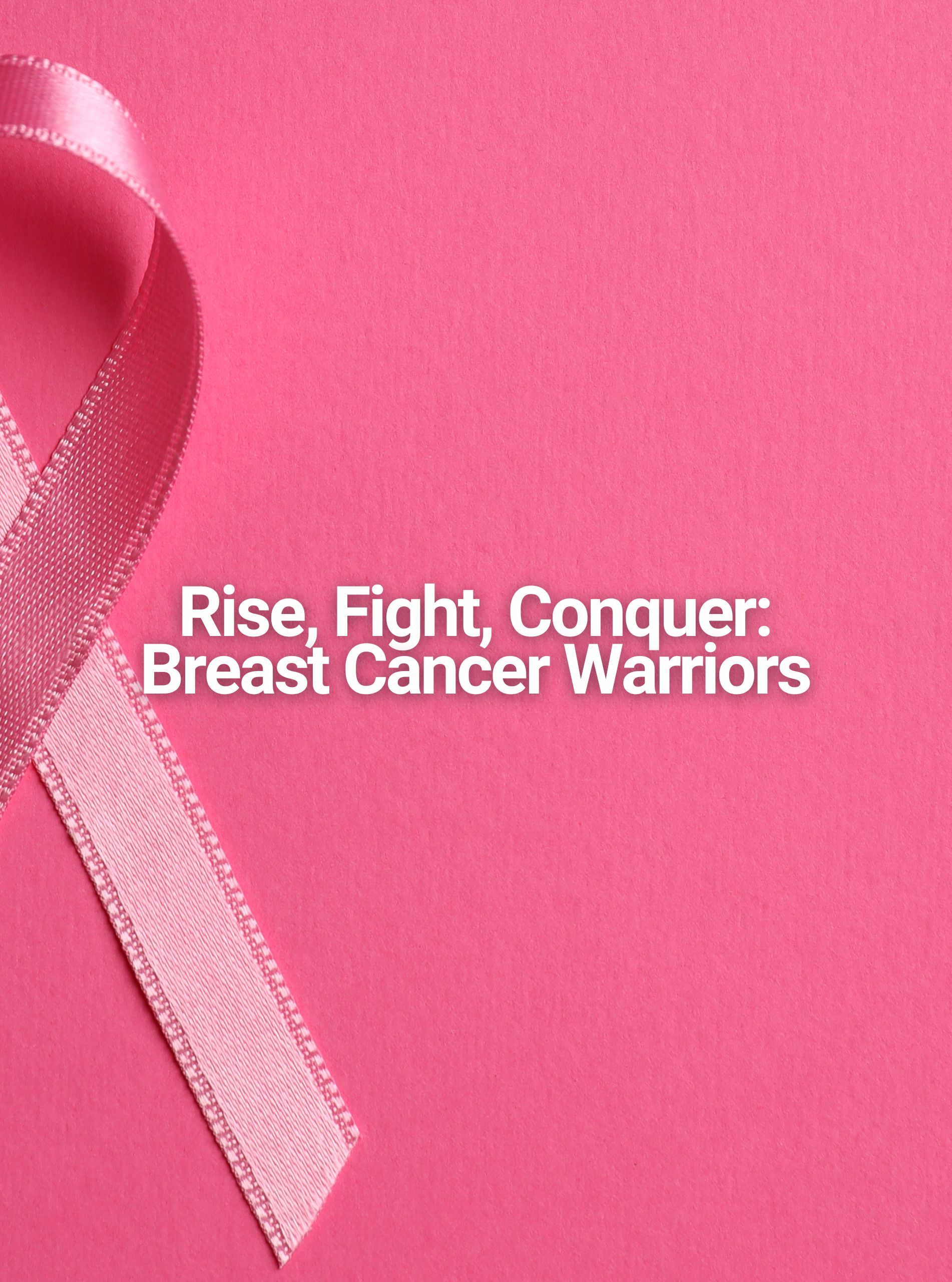

Making healthy food and lifestyle choices after being diagnosed with breast cancer is critical for your overall health. It can help protect against heart disease, diabetes, osteoporosis, and other cancers. Eating well will also help your body regain your muscle strength and minimize the side effects such as anemia or fatigue. It may also help reduce the likelihood of breast cancer recurring.
This article offers advice on healthy eating and living. If you are having difficulty eating, have experienced unintended weight loss, or are experiencing side effects from chemotherapy or radiation treatments, the information in this handout may not be appropriate for you. Instead, consult with a registered dietitian to create a personalised nutrition plan that meets your specific requirements.
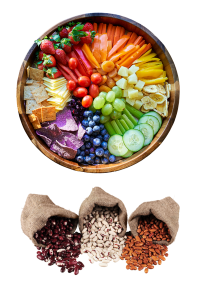
Incorporating these foods would ensure that you have a good source of fibre, variety of vitamins, minerals and other cancer-protective components.
We suggest you fill half your plate with vegetables and fruits, one-quarter with whole grains, and one-quarter with meat or meat alternatives such as legumes, fish, eggs, or other meats. The example of whole grains includes oats, barley, whole grain whole wheat and quinoa. Legumes include soybeans, dried peas, beans, lentils and chickpeas.
Avoid excluding legumes and soy foods as part of your balanced diet over meat.

A healthy weight combined with a healthy diet can reduce the risk of developing new cancers and health problems such as diabetes and heart disease.
A healthy diet and an active lifestyle can help you manage your weight while undergoing breast cancer treatment and afterward. Consult a registered dietitian if you are concerned about your weight or are underweight.

Incorporate small amounts of “healthy fats” on a daily basis. Healthy fats can be obtained from:
How you cook at home also plays a role as part of a healthy diet. We encourage you to prioritise cooking methods such as broiling, steaming and roasting that do not need added fat instead of deep frying.
There are foods that contain high amounts of unhealthy fats – the saturated fat. It is available in:
“Moderation is the key.” If you do eat these foods, you may start with smaller portions and gradually reduce the frequency with which you eat them.

Foods high in added sugars are typically higher in calories, and frequent consumption may result in weight gain. They are also typically deficient in cancer-fighting nutrients. Tips for reducing added sugars:

Being physically active can help you stay healthy and feel better during and after breast cancer treatment. It may also reduce the risk of recurrent breast cancer. When combined with a healthy diet, it can help you achieve and maintain a healthy weight.
We recommend the following tips to help you become more active:
Aim for at least 150 minutes (two and a half hours) of moderate to vigorous activity per week that increases your heart and breathing rate. You may include activities you enjoy, such as brisk walking, swimming, or cycling. If necessary, divide the activity into 10 to 15 minute sessions.
It is also helpful to include two strengthening activities on a weekly basis, such as lifting weights, heavy yard work or using resistance bands on a weekly basis.
While physical activity is generally safe, consult with your doctor or health care professionals to determine what types and amounts of activity are best for you.

Calcium and vitamin D are essential nutrients for healthy bones and some breast cancer treatments such as chemotherapy and hormone therapy can cause a reduction in the amount of oestrogen made in the body, thereby weakening your bones.
To ensure you have a good amount of calcium, we encourage you to include calcium-rich foods and beverages in your diet on a daily basis.
Low fat dairy products like milk (skim, 1%, 2%), milk-based products (yogurt, kefir, and cottage cheese), and calcium fortified soy or other plant-based beverages are all good sources of calcium. When it comes to milk, low fat is the most common option.
To ensure you have a good amount of vitamin D, we encourage you to include vitamin D-rich foods and beverages in your diet on a daily basis.
Food containing good sources of Vitamin D include milk, fortified soy beverage and other plant-based beverages, and fatty fish.
If you believe you are not getting enough calcium from food and beverages, consult a dietitian before taking calcium supplements.

Many women wonder if certain foods or supplements should be included or avoided due to their effect on breast cancer growth. There is not enough research at this time to conclude that eating specific foods or taking specific supplements affects the growth of breast cancer.
The following are answers to frequently asked questions.
Soy and flaxseed:
Soybeans, soy foods (such as soy beverage, soy nuts, tofu, tempeh and edamame (green, young soybeans)) and ground flaxseed are a source of phytoestrogens.
Phytoestrogens (also known as plant estrogens) are plant-derived hormones that are similar to oestrogen.
Previous animal studies raised concerns that phytoestrogens in soy could promote the growth of breast cancer. However, according to current research, eating soy foods after a breast cancer diagnosis is safe. Other plant foods may have phytoestrogens, but only in trace (low) amounts.





Some women are also concerned about the possible presence of hormones in milk and milk products.
The use of growth and milk producing hormones in dairy cows is heavily regulated and prohibited. In fact, low fat milk and milk products are high in calcium, vitamin D, and protein and can be incorporated into a healthy diet.

Alcohol consumption increases the risk of developing breast cancer. However, It is unknown whether drinking alcohol increases the risk of recurrent breast cancer. Guidelines for cancer prevention recommend that women limit their alcohol consumption to no more than one drink per day or none at all.

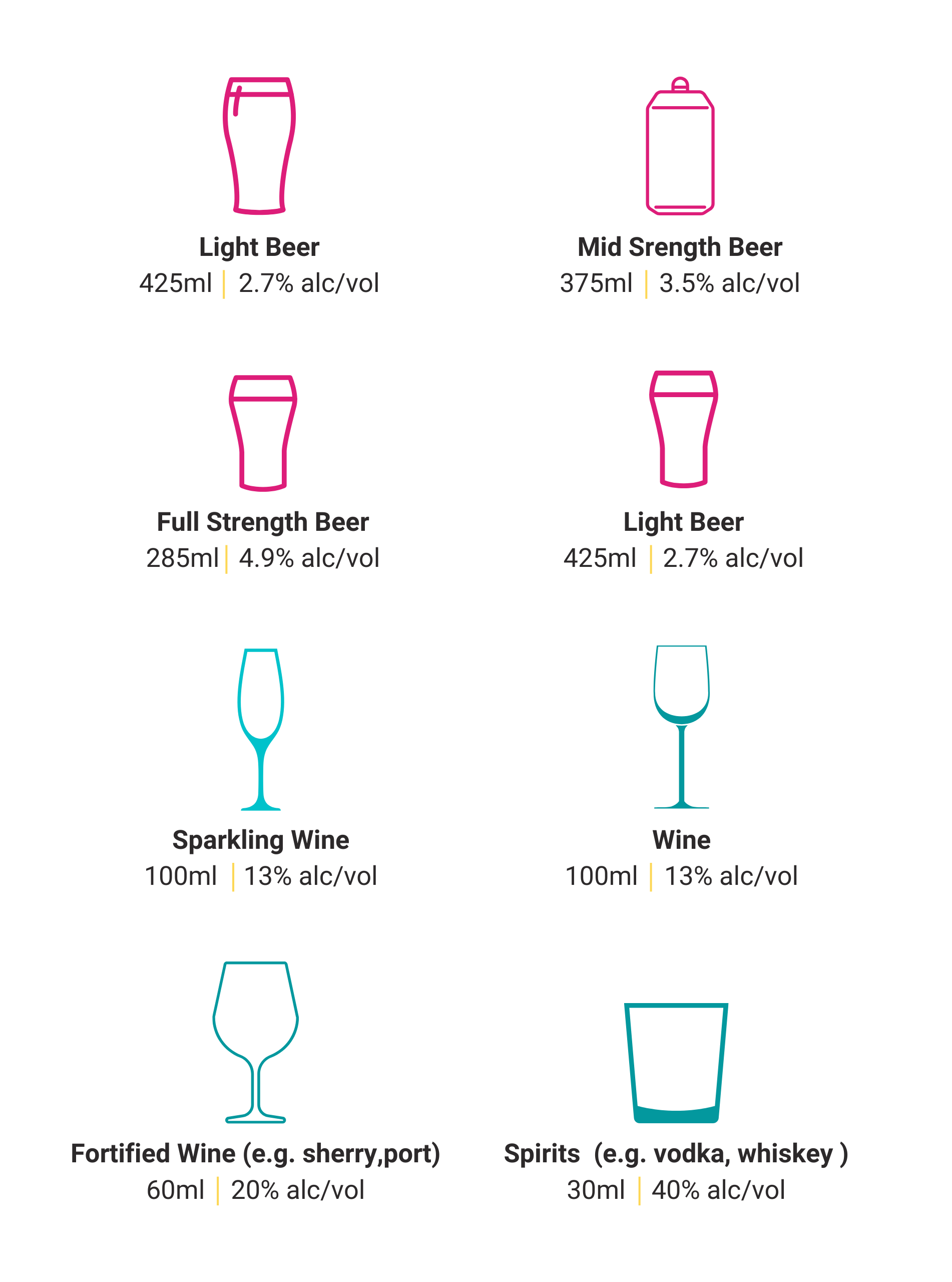

Individual herbal, vitamin, and mineral supplements are not recommended for preventing or treating breast cancer. It’s unclear whether taking any supplement helps prevent breast cancer from worsening or returning. There are fears that supplements will interfere with cancer treatments or have other unintended consequences.
However, taking a standard multivitamin mineral supplement during cancer treatment is generally safe for most people.
If you are concerned that you are not getting enough vitamins and minerals from your diet or if you have questions about supplements, consult a dietitian.


Ms. Olivia O Pau Hui
Registered Dietitian
Manager, Dietetics & Nutrition



Ever heard of people calling blueberries, broccoli, green tea, tomatoes, and other fruits and vegetables ‘superfoods’? This word is used to describe foods that supposedly improve health and prevent diseases like cancer, but this is not backed up by science.
It’s true that a healthy, balanced diet can help to reduce the risk of cancer, but it is unlikely that any single food will make much of a difference on its own.

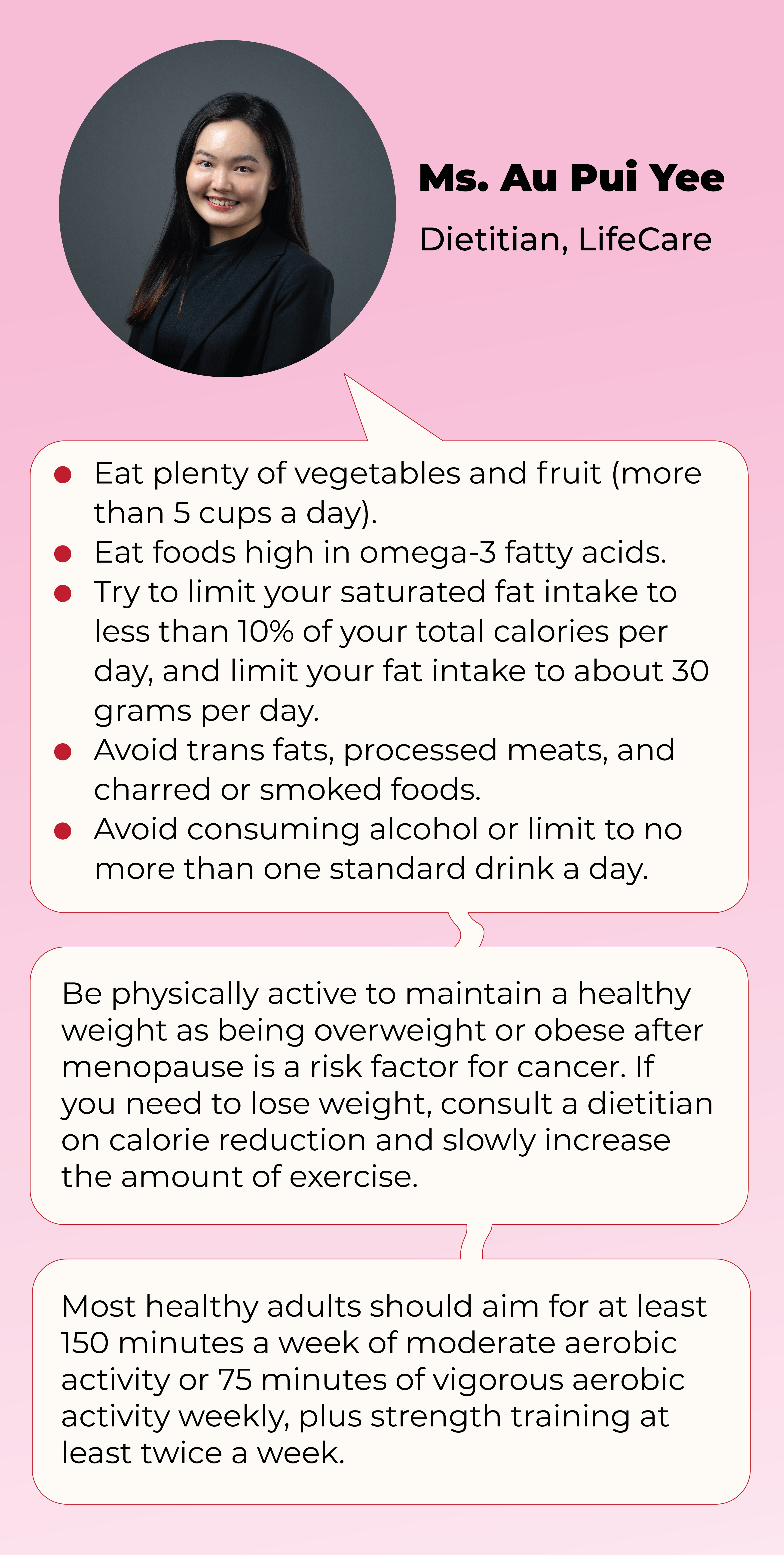
Life Care Diagnostic Medical Centre Sdn. Bhd. 200401034597 (673106-V)
Bangsar South
WhatsApp: 0122343610
1st Floor, Wisma Lifecare,
No. 5, Jalan Kerinchi, Bangsar South,
59200 Kuala Lumpur
Cheras South
WhatsApp: 01127213620
19A-2 & 19B-2, Block E, Kompleks Komersil Akasa,
Jalan Akasa, Akasa Cheras Selatan,
43300 Seri Kembangan, Selangor
Operating Hour:
Monday – Friday: 8.00am – 5.00pm
Saturday: 8.00am – 1.00pm
Sunday & Public Holidays: Closed
